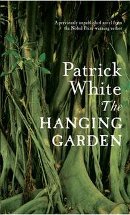The Hanging Garden by Patrick White

Knopf Australia, 2012. ISBN 9781742752655.
Highly recommended. The Hanging Garden is a hitherto unpublished
work by the deceased Nobel Prize winner Patrick White. White had
instructed his literary executor to destroy all letters and
unpublished work on his death, but this was not done and on the
urging of David Marr, White's biographer, this work has finally been
published. It is a fragment of what seems to have been intended to
be a longer work, but is quite complete and satisfying in itself,
and very enjoyable. The story's central characters are two children,
'reffoes' as they call themselves, sent to live in Sydney while
World War II is being fought in Europe. The relationship they form
with each other is informed by their previous lives in which they
have each lost a parent, seen death and been excluded from their
homes. Gilbert has come from England, Eirene from Greece. Such
experiences are unimaginable for the Australians who care for them,
and whose chief aim seems to be making the children Australian, thus
ensuring health and happiness. The children quickly learn to hide
their individuality and their histories, except from each other. For
Eirene Gilbert is a source of knowledge and comfort; she divines his
need to assume protective colouring in the form of rough speech and
behaviour, and his wish to experience more than the everyday. Eirene
is exotic to Gilbert; she has seen volcano, a man squashed by a
tank, she speaks Greek and seems to have religion. Together they
explore the garden on the cliff overhanging the harbour and develop
a kind of intimacy, against the backdrop of an Australia that is
almost one-dimensional and very easy to caricature. When their
guardian, too fond of a tipple, dies they are separated. The story
follows Eirene as she survives life with her aunt, six cousins,
named Bruce, Keith, Bob, Lex, Col and Wal, and their licentious
father, while Gil disappears off to a privileged school in
Vaucluse. White's prose is assured with many astute and
amusing observations about adult vanities and hypocrisies. The
language is rich in metaphor, Bob and Lex, for example, being
described as 'freckled, pig-rooting brumbies' in their classroom
behaviour, and very engaging. The children are masterful creations,
and the reader leaves them with regret when the fragment concludes
with the end of the European war. This is a highly recommended work.
Jenny Hamilton